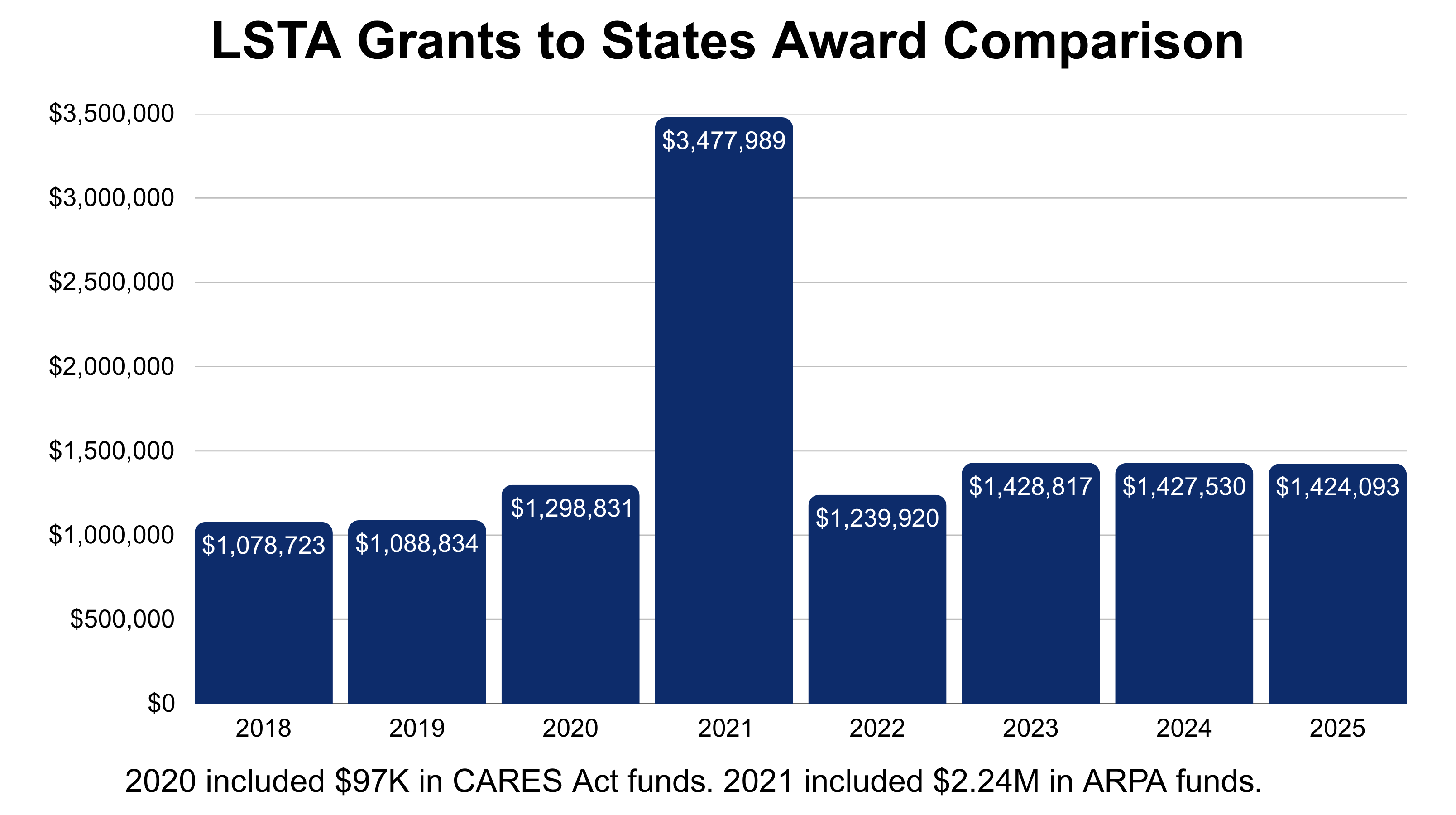Federal Library Funds at Work
Federal funds play a critical role in supporting library services across Montana. The U.S. Congress appropriates funds which are distributed to states and territories through the Institute of Museum and Library Services (IMLS) under the Library Services and Technology Act (LSTA) Grants to States Program. Montana libraries benefited from $1.4 million in state fiscal year 2025.

The LSTA program, part of the Museum and Library Services Act (MLSA), is up for Congressional reauthorization every five years, with the current authorization set to expire on September 30, 2025.
Essential library resources such as the digital card catalog and the Libby app are made possible by IMLS grant funds, with additional state and local support. These resources and services ensure that all Montanans have sufficient access to the information, technology, and learning experiences they need to achieve their personal, educational, and professional goals.
How are LSTA projects funded?
State and local funds play a crucial role in LSTA-funded projects by providing the required match to federal Library Services and Technology Act grants. In Montana, local communities contribute 32%, the state 30%, and the federal government 38%. Local investments, such as cost sharing for the Montana Shared Catalog, the statewide online library catalog, and MontanaLibrary2Go for eBooks, reflect Montanans’ strong commitment to expanding access to information and technology. Ongoing collaboration among federal, state, and local partners ensures that libraries provide vital resources and opportunities that benefit all Montanans.

Budget line items funded by federal dollars
The following project budgets and statistics reflect expenditures from the LSTA 2023 award, used between July 2023 and June 2024. The final report for the LSTA 2024 award, covering state fiscal year 2025, will be submitted to IMLS in January 2026.
Digital Card Catalog
Federal funds: $245,808 | Total Investment: $780,543
The Montana Shared Catalog, a digital card catalog, connects 210 libraries across 49 counties, serving 434,000 Montana library cardholders with unprecedented resource access. Small rural libraries like Philipsburg Public Library can now offer patrons over 3 million books statewide, dramatically expanding beyond their local collection of 6,679 books. This collaborative system ensures Montanans in communities of all sizes have access to information resources essential for education, economic opportunity, and civic engagement.
Statewide Resource Sharing
Federal funds: $228,625 | Total Investment: $1,095,755
The Montana Library Network delivers seamless statewide access to materials through interlibrary loans, physical book courier service, and digital access via the Libby app. The impact is substantial: Montanans from 54 counties borrowed 1,576,512 e-books from MontanaLibrary2Go and received 495,851 physical books via courier in 2024. This infrastructure reduces wait times and ensures widespread access to information resources for rural and urban Montanans alike.
Montana History & Cultural Resources
Federal funds: $225,263 | Total Investment: $242,263
The Montana History Portal serves as the definitive online hub for Montana's historical and cultural heritage, providing public access to over 90,000 digitized photographs, yearbooks, livestock brands, and primary sources from 103 contributors. This essential resource generated 1.3 million page views last year, allowing citizens to connect with their Montana story while preserving irreplaceable historical assets for future generations. Engagement initiatives like a LEGO history program and teacher workshops encouraged creative use of the collections.
Services for People with Disabilities
Federal funds: $117,720 | Total Investment: $167,648
Talking Book Services provided accessible reading materials to 2,000 Montanans with print disabilities across 53 counties. Eligible residents, including blind and low-vision community members, borrowed 155,504 Braille and digital books, representing a 97% increase in digital circulation. Mobile recording efforts brought studios to storytellers, capturing local stories, including stories and oral histories in Indigenous languages. These recordings were made available for download from the National Library Service for the Blind and Print Disabled. This critical service ensures all Montanans can access literature, information, and entertainment regardless of physical reading challenges, supporting lifelong learning and independence.
Government Information
Federal Funds: $26,000 | Total Investment: $164,984
The Montana State Library preserves and improves access to information from state, county, school district, library district, and tribal governments. Using Archive-It technology, the library has created collections containing over 367 million items, the largest repository of Montana government information. This preservation effort ensures transparency and accountability while maintaining historical records for researchers, policymakers, and Montana citizens.
Library Data Coordination
Federal Funds: $11,099 | Total Investment: $11,099
Data collection software streamlines reporting for public and tribal college libraries statewide. For the first time, six of seven tribal college libraries participated in the Public Libraries Survey, contributing to a 97% statewide completion rate. This comprehensive data about libraries enables libraries to make fiscally responsible decisions, maximizing taxpayer dollars. The resulting metrics ensure strategic allocation of resources where they deliver the greatest benefit to Montana residents.
Library Consulting
Federal funds: $325,050 | Total Investment: $325,050
Montana State Library’s consulting team conducted 759 consultations with library leaders statewide, equipping them with essential skills in budgeting, policy development, and strategic planning. Consultants strengthened civic engagement by training library staff to become effective partners with local government, creating powerful community collaborations. Four comprehensive handbooks were updated, providing practical guidance on library law, budget management, and governance, resources that empower Montana's libraries to serve as vital community anchors.
Continuing Education
Federal funds: $94,370 | Total Investment: $94,370
Montana's libraries are stronger through the Continuing Education program, which certified 101 library professionals in 2024. Staff completed nearly 7,000 hours of professional development through the on-demand MSL Learn platform and expert-led training. This certification system establishes standards of excellence that directly translate to better service for Montana communities and more efficient use of local resources.
Lifelong Learning
Federal funds: $58,372 | Total Investment $58,372
Lifelong Learning initiatives reached Montanans from preschoolers to seniors through customizable, community-focused programs. Early literacy and summer reading efforts were bolstered statewide, while innovative virtual programs on Montana-relevant topics like rockhounding attracted over 3,200 participants. An early literacy texting service delivered developmental tips to 928 Montana families, supporting educational readiness in communities across the state.
Technology Support
Federal funds: $96,510 | Total Investment: $510,695
Montana State Library's technology initiatives have transformed digital access across our state, with 86 libraries lending hotspots in 51 counties, delivering over 2.19 petabytes of data to Montanans without reliable internet. Network upgrades boosted library broadband speeds by up to 400%, dramatically improving patron access to educational resources, telehealth services, and employment opportunities.
Current level of threat to these funds

Montana’s federal LSTA funding for state fiscal year 2025 is fully spent. MSL received an award notice for LSTA 25, to be spent in state fiscal year 2026, but potential federal rescission packages introduce some uncertainty regarding the full receipt of these funds, placing them at moderate risk. Funding for state fiscal year 2026 is rated between green and yellow, reflecting both the current award status and the possibility of changes at the federal level. It also takes into account the December 2025 action from IMLS to reinstate all federal grants previously terminated. While this is hopeful news, the long-term outlook remains uncertain, as the Museum and Library Services Act (MLSA) is up for reauthorization and the president’s budget proposal calls for the orderly dismantling of the Institute of Museum and Library Services (IMLS), which administers LSTA. This creates ongoing risk for future federal support for Montana libraries.
LSTA Grant Funding Timeline

Each grant has a two-year award period based on the federal fiscal year which is October 1 to September 30. Montana typically expends its award to align with a single state fiscal year, July 1 to June 30.
- 2024 LSTA Grant – the two-year award period began October 1, 2023 and closes September 30, 2025. Montana spent these funds July 1, 2024 through June 30, 2025 (state fiscal year 2025).
- 2025 LSTA Grant – the two-year award period began October 1, 2024 and closes September 30, 2026. Montana begins spending these funds July 1, 2025 and plans to continue spending these funds through June 30, 2026 (state fiscal year 2026).
- 2026 LSTA Grant – the two-year award period begins October 1, 2025 and closes September 30, 2027. Montana plans to begin spending these funds July 1, 2026 (state fiscal year 2027).
Resources
Additional Details
The Grants to States Program is established in Statute (Section 231(a) (20 U.S.C. 9141(a)). Funding for Grant to States program was most recently (re-)authorized as part of the Museum and Library Services Act (MLSA) of 2018.
MSL is not currently speculating about what the loss of LSTA funds might mean at this time. Based on all available information, to do so would be premature. MSL remains vigilant in our efforts to understand and respond to this fluid situation and will respond appropriately if and when the situation changes.
Should budget cuts be necessary, decisions about how to apply those cuts, including decisions about whether programs continue would be made in conjunction with the Montana State Library Commission and Montana libraries.
Frequently Asked Questions
How will cutting the Institute of Museum and Library Services (IMLS) ultimately affect my local library down the road?
At this time, the Montana State Library has not experienced any funding cuts. While several IMLS grant recipients nationwide received cancellation notices in spring 2025, the Montana State Library was not among them. In December 2025, IMLS announced the reinstatement of all previously terminated grants. Although this reinstatement is good news and helps stabilize federal support, potential future cuts remain a concern based on federal budget trends across other agencies. The Montana State Library continues to plan carefully and prepare for any possible funding changes.
How much does my library typically receive from IMLS monies distributed by the state?
The State Library receives approximately $1.4 million from a program called Library Services and Technology Act - Grants to States. IMLS funds are used in a variety of ways to support services used by many local libraries. More information about how the State Library spends Grants to States funding is online through our LSTA Dashboard, LSTA Financial Reports, and our LSTA 2023 one-page report. Note, LSTA 2024 spending concluded on June 30, 2025.
What percent of my local library’s budget is supported by IMLS funds?
Local libraries do not directly receive LSTA Grants to States funds. State library staff are working on a financial analysis of what it could cost libraries if Montana libraries absorbed potential federal cuts, assuming libraries wanted to take on those costs. No decisions have been made about how the State Library would absorb cuts and how those cuts would impact programs.
How does funding from the IMLS help my local library?
IMLS funds pay part of the costs and salaries associated with contracting for and running MontanaLibrary2Go, the Montana Shared Catalog, the OCLC Group Services contract, the Montana History Portal, and the courier service. IMLS funds also pay for State Library staff who help libraries with strategic planning, budgeting, policy development, continuing education, programming idea, and other questions about library services.
How often does my local library typically receive IMLS funding distributed by the state?
LSTA Grants to States funds do not directly come to local libraries. They are used to reduce the cost of services provided by local libraries. However, some local libraries have received funds from the IMLS through other grant programs such as the Laura Bush 21st Century Librarian Program, National Leadership Grants for Libraries, and Native American Library Services Grants. To see grants in your community, see the Awarded Grants Database on the IMLS website.
